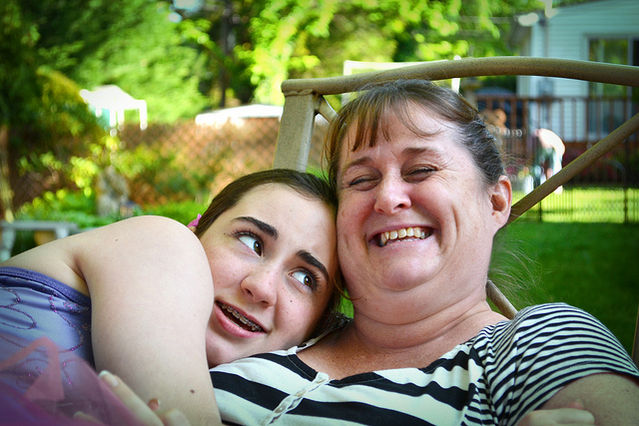Parenting
What’s the Hardest Stage of Parenting?
New research shows the ups and downs of parenting children of different ages.
Posted March 31, 2016 Reviewed by Devon Frye

At every age, children present parenting challenges.
With infants, parents have to cope with physical exhaustion from sleep deprivation and the non-stop cycle of feeding, burping, cleaning, and comforting a fussy baby.
During the toddler years, parents have do deal with an opinionated little person who is simultaneously trying to figure out the world and run it.
The school years introduce academic and social challenges, and parents have to figure out how to support and guide kids while also setting sensible limits.
With teens and tweens, concerns about academic and social challenges may intensify, and parents face the job of staying connected with their kids as their kids increasingly focus beyond the family. They also need to help kids balance independence versus responsibility.
But which stage is hardest for parents?
Which stage of parenting is most challenging?
Obviously, the answer varies a lot for different parents with different kids and different circumstances. However, a survey of over 2000 well-educated moms by Suniya Luthar and Lucia Ciciolla at Arizona State University offers one answer: On average, mothers of middle schoolers (12- to 14-year olds) generally feel worse than parents of infants, preschoolers, elementary school children, high school children, and adult children. Moms of middle schoolers report markedly less parenting satisfaction than other moms.
Looking in more detail, the study found is a consistent pattern of maternal distress peaking when kids are in middle school. Moms of middle schoolers report more stress, emptiness, loneliness, life dissatisfaction, and lack of fulfillment, and they viewed their middle school children’s behavior in less positive ways, although the differences between adjacent ages on these more fine-grained variables was not necessarily dramatic or statistically significant.
The study also found that the low parenting satisfaction of middle school moms is not entirely due to their kids having adjustment problems or behaving in rude or hurtful ways. Something more is going on.
Why are the early adolescent years so hard for parents?
Not every child is challenging in the tween and early teen years. Some kids sail through this stage. On the other hand, I’ve had more than a few parents of middle schoolers in my practice ask in bewilderment, “What happened to the sweet kid I used to know?!”
Developmentally, the early adolescent years are a time when kids become increasingly focused on establishing an independent identity, outside the family. They’re also facing hormonal changes related to puberty. Many middle schoolers also have to learn to navigate bigger, more impersonal schools with complicated social hierarchies and greater academic demands.
Kids this age feel constantly judged but are also often very critical of others. They tend to be acutely aware of what is or isn’t cool. They vacillate between acting arrogant and feeling insecure. They’re argumentative, and sometimes even vicious, but also easily hurt. They can be sullen and moody at home, but excited and outgoing with friends.
Parenting young adolescents can be challenging partly because their stress tends to rub off on us. The adage, “A mom is only as happy as her least happy child,” carries a lot of truth.
This stage can also be difficult because we may feel a new distance separating us from our young adolescents. It can be confusing and hurtful when our beloved children suddenly seem to view everything we say or do in the worst possible light. They snarl at us and save their charm for others. We may feel like we’re groping in the dark, as we try to keep up with the rapid changes in our children and figure out how to navigate this unexplored parenting terrain.
How can parents cope with the middle school years?
The challenges of being the parent of a middle schooler mean that this is an especially important time for parents to take care of themselves as well as caring for their children. Here are some possibilities:
1. Develop your non-parent self.
The fact that your middle schooler is moving toward greater independence makes room for you to do the same. Developing interests and enjoyable activities beyond your role as a parent is satisfying, and it helps you keep things in perspective. Pursuing your interests can even improve your relationship with your middle schooler because it gives you something positive to talk about.
2. Seek support.
Everyone needs a confidante. Hearing that your close friend is struggling with similar parenting issues can be reassuring and comforting. On the other hand, tweens and teens hate it when their parents talk about them to other people. So, be judicious about what you confide to whom and when.
3. Minimize power struggles.
Everyone loses when parents and teens get into head-to-head battles. Keep your rules few. Say "please" and "thank you." (Too often, we use our worst manners with the people we love most!) Try to provide a rationale that makes sense to your teen. Be open to polite negotiation and genuinely work to see things from you teen’s perspective. Whenever possible, say “yes” or offer a compromise.
Nagging irritates teens. If you have an important point to make, compress it down to one sentence, say it, and then get out of the room. The parent-vs-kid battle is too easy for teens. You want the battle to stay where it belongs, inside your teen, between the part that know the right thing to do and the part that doesn’t feel like doing it.
4. Hang on.
Remind yourself, “It’s a stage.” The chances are very good that if you just hang on and try to stay connected to your middle schooler, your relationship will improve substantially, maybe as soon as when your child reaches age 15. In the Luthar and Ciciolla study, having a high schooler was easier on parents than having a middle schooler, and having an adult child was a particularly satisfying stage of parenting. Little kids are cute, but having an older teen or adult child opens the door to a deeper, more equal connection.
5. Develop amnesia.
Don’t bring up your teen’s past failings. Young adolescents are changing so rapidly, anything they did last month was done by an entirely different person. Try to start every day with a clean slate for your child. One of the most loving things we can do as parents is to develop amnesia for the mistakes and struggles our kids have had in the past. This gives them room to grow, instead of anchoring them to the past, and helps us be open to embracing their new people they are becoming.
Do you have an opinion about which is the hardest stage of parenting?
Related Posts
Preventing Mom Meltdowns and Dad Detonations
Helping the “Bad Kid” of the Family
Growing Friendships blog posts are for general educational purposes only. They may or may not be relevant for your particular situation. You’re welcome to link to this post, but please don’t reproduce it without written permission from the author.
© Eileen Kennedy-Moore, Ph.D.
References
Luthar, S. S. & Ciciolla, L. (2016). What it feels like to be a mother: Variations by children’s developmental stage. Developmental Psychology, 52, 142-154.




